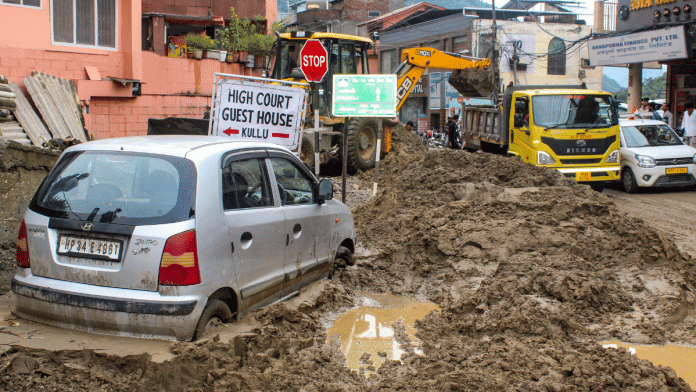New Delhi: Over a 100 retired bureaucrats have urged the 16th Finance Commission to establish a new mechanism that compensates Himachal Pradesh and other Himalayan states for their ecological contributions to the country at a time when disasters have devastated these regions.
As part of the ‘Constitutional Conduct Group’, retired bureaucrats on 3 November wrote a letter to the commission’s chairperson Arvind Panagariya, saying that the states’ natural resources were essential for India’s economy, and yet, they hadn’t been compensated.
“Himalayan states like Himachal, Uttarakhand, Kashmir and Sikkim are slowly going to pieces, literally, under the onslaught of cloudbursts, flash floods, land subsidence and collapsing infrastructure,” the letter read.
The group said that between 2022 and 2025, Himachal Pradesh suffered losses amounting to Rs 18,000 crore while Uttarakhand loss was up to Rs 5,000 crore due to natural calamities just this year. These include the Dharali cloud burst, and Dehradun and Uttarkashi floods in Uttarakhand, and landslides in Himachal’s Lahaul-Spiti and floods in Chamba this year.
Added to this, the ‘forest wealth’ of these states was high, with Himachal’s overall value calculated at Rs 9.9 lakh crore, the letter read, citing the Indian Institute of Forest Management’s 2025 analysis.
Finance commissions are tasked with recommending the central government on distribution of taxes and levies among states. The 16th Finance Commission, formed in 2022, is supposed to submit its recommendation to the Centre by 30 November this year.
To better compensate the states, the letter urged the commission to reconsider the methodology to allocate central funds.
“The current weightage given for forests and ecological services is only 10%. This is wholly inadequate considering the imperatives of climate control goals and only disincentivises states from bringing more area under green cover. This weightage needs to be increased to at least 20%,” it said.
The letter also highlighted a proposal by the Himachal Chief Minister for serious consideration.
“The Himachal Chief Minister has taken up this matter of the creation of a green fund or green bonus … requesting for an outlay of ₹50,000 crore for incentivising the mountain states. This proposal must be considered seriously,” it said.
‘A double whammy’
The letter outlined how Himalayan states face a “double whammy” – suffering disproportionately from disasters and simultaneously experiencing revenue deficits due to “limited sources of income” that prompt overexploitation of natural resources.
“Without adequate manufacturing and job creation in other sectors, these states rely on exploiting their natural resources through hydropower projects, tourism, and construction,” it said.
Compounding the crisis, most Himalayan states have lost significant forest cover.
A comparison between the India State of Forest Reports from 2011 and 2021 shows that except for Jammu and Kashmir, every other state including Assam, Manipur, Nagaland, and Uttarakhand has lost forest cover over the decade.
In July this year, the Supreme Court had cautioned against ecological imbalance destroying Himachal Pradesh and said the entire state “may vanish in thin air” if the situation doesn’t change.
“We want to impress upon the state government and Union of India that earning revenue is not everything. Revenue cannot be earned at the cost of environment and ecology… If things proceed the way they are as on date, the day is not far when the entire state of HP may vanish in thin air from the map of the country,” a two-judge bench had said.
Environmentalists call for accountability
Asked about the grouping’s letter, environmentalists said they support financial aid but the states, too, must be held accountable for their role in ecological destruction.
“The states themselves have destroyed their ecology through these development projects like highways and dams, and even central agencies are complicit in this. If the states get more financial assistance from the Centre, it shouldn’t go towards more development projects,” said Himanshu Thakkar, coordinator of South Asia Network on Dams, Rivers and People (SANDRP).
The CCG acknowledged this concern in the letter and proposed that green bonus should not be a “free pass” but should come with conditions focused on improving forest cover, promoting sustainability in construction and tourism, and curbing illegal mining.
Thakkar reinforced this view, advocating for a change in terminology. “The money should be called financial incentive, and not compensation. Don’t compensate them for their natural resources, but rather provide them incentive to protect their resources,” he said.
Signatories to the letter include retired IAS officer Meena Gupta (former environment secretary), retired IPS officer A.S. Dulat (former OSD on Kashmir, Prime Minister’s Office), Nitin Desai (former chief economic adviser), and retired IAS officer Aruna Bagchee (former joint secretary, ministry of mines).
Also Read: Himachal’s snow leopards are protected by women. Big cat numbers are up






